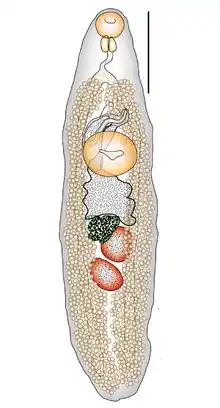Hamacreadium
Hamacreadium is a genus of trematodes in the family Opecoelidae. It is synonymous with Olivacreadium Bilqees, 1976.[2] Species of Hamacreadium are endoparasitic in fish such as Lethrinus Cuvier, 1829.[3]
| Hamacreadium | |
|---|---|
 | |
| Hamacreadium cribbi Bray & Justine, 2016 | |
| Scientific classification | |
| Kingdom: | |
| Phylum: | |
| Class: | |
| Order: | |
| Family: | |
| Subfamily: | Hamacreadiinae |
| Genus: | Hamacreadium Linton, 1910[1] |
Species
- Hamacreadium cribbi Bray & Justine, 2016[4]
- Hamacreadium hainanense Shen, 1990[5]
- Hamacreadium interruptum Nagaty, 1941[6]
- Hamacreadium lethrini Yamaguti, 1934[7]
- Hamacreadium longivesiculum (Yamaguti, 1952) Martin, Cutmore, Ward & Cribb, 2017[8][9]
- Hamacreadium lutiani (Shen, 1990) Martin, Cutmore, Ward & Cribb, 2017[5][9]
- Hamacreadium morgani Baz, 1946[10]
- Hamacreadium mutabile Linton, 1910[1]
- Hamacreadium phyllorchis (Bilqees, 1976) Cribb, 2005[2][11]
Species synonymised with species of Hamacreadium
- Hamacreadium hainanense Shen, 1990[5]
- Maculifer spiralis Soota, Srivastava & Ghosh, 1970[12]
- Hamacreadium interruptum Nagaty, 1941[6]
- Hamacreadium interruptus Nagaty, 1941[6]
- Hamacreadium longivesiculum (Yamaguti, 1952)[8]
- Hamacreadium lutiani (Shen, 1990) Martin, Cutmore, Ward & Cribb, 2017[5][9]
- Podocotyle lutiani Shen, 1990[5]
- Hamacreadium morgani Baz, 1946[10]
- Hamacreadium agyptia Abdou, Heckmann, Beltagy & Ashour, 2001[13]
- Hamacreadium balistesi Nagaty & Abdel-Aal, 1962[14]
- Hamacreadium egyptia Abdou, Heckmann, Beltagy & Ashour, 2001[13]
- Hamacreadium lenthrium Manter, 1963[15]
- Hamacreadium lethrini Nagaty & Abdel-Aal, 1962[14]
- Hamacreadium nagatyi Lamothe-Argumedo, 1962[16]
- Hamacreadium nebulosae Nagaty & Abdel-Aal, 1962[14]
- Hamacreadium mutabile Linton, 1910[1]
- Hamacreadium indicum Gupta & Tewari, 1985[17]
- Hamacreadium phyllorchis (Bilqees, 1976)[2]
References
- Linton, E. (1910). Helminth fauna of the Dry Tortugas. II. Trematodes. Papers from the Tortugas Laboratory of the Carnegie Institute of Washington, 4, 11–98.
- Bilqees, F. M. (1976). Olivacreadium n. gen. (Trematoda: Opecoelidae) based on two new species from the fishes of the Karachi coast. Norwegian Journal of Zoology, 24, 33–36.
- Cuvier, G. (1829). Le règne animal distribué d'après son organisation, pour servir de base à l'histoire naturelle des animaux et d'introduction à l'anatomie comparée. Paris: Chez Déterville.
- Bray, Rodney A.; Justine, Jean-Lou (2016). "Hamacreadium cribbi n. sp. (Digenea: Opecoelidae) from Lethrinus miniatus (Forster) (Perciformes: Lethrinidae) from New Caledonian waters". Systematic Parasitology. 93 (8): 761–770. doi:10.1007/s11230-016-9662-8. ISSN 0165-5752. PMC 5023753. PMID 27638731.

- Shen, J. W. (1990). Digenetic trematodes of marine fishes from Hainan Island. Beijing: Science Press.
- Nagaty, H. F. (1941). Trematodes of fishes from the Red Sea. Part 2. The genus Hamacreadium Linton, 1910 (Fam. Allocreadiidae) with a description of two new species. Journal of Research of the Egyptian Medical Association, 24(7), 300–310.
- Yamaguti, S. (1934). Studies on the helminth fauna of Japan. Part 2. Trematodes of fishes. I. Japanese Journal of Zoology, 5, 249–541.
- Yamaguti, S. (1952). Parasitic worms mainly from Celebes. Part 1. New digenetic trematodes of fishes. Acta Medicinae Okayama, 8(2), 146–198.
- Martin, S., Cutmore, S., Ward, S. & Cribb, T. (2017). An updated concept and revised composition for Hamacreadium Linton, 1910 (Opecoelidae: Plagioporinae) clarifies a previously obscured pattern of host-specificity among species. Zootaxa, 4254(2), 151–187.
- Baz, I. I. (1946). A fish trematode of the genus Hamacreadium Linton, 1910 (F. Allocreadiidae). Journal of the Egyptian Medical Association, 29, 55–61.
- Cribb, T. H. (2005). Family Opecoelidae Ozaki, 1925. In Bray, R., Gibson, D. & Jones, A. (Eds.), Keys to the Trematoda, Volume 2 (pp. 443–531). London: CABI Publishing and The Natural History Museum.
- Soota, T. D., Srivastava, C. B. & Ghosh, R. K. (1970). Studies on the helminth fauna of the Great Nicobar Island. Part I. Trematoda. Proceedings of the 56th Indian Science Congress, 3, 503–504.
- Abdou, N. L., Heckmann, R. A., Beltagy, S. M. & Ashour, A. A. (2001). Pseudoplagioporus interruptus Durio and Manter, 1968 and Hamacreadium agyptia sp. n. (Trematoda: Opecoeliidae) from the Red Sea Fish in Egypt. Journal of King Abdulaziz University, Marine Science, 12, 175–188.
- Nagaty, H. F. & Abdel-Aal, T. M. (1962). Trematodes of fishes from the Red Sea, part 19. On three new species of Podocotyle (Family Allocreadiidae). Journal of Parasitology, 48(5), 746–747.
- Manter, H. W. (1963). Studies on digenetic trematodes of fishes of Fiji. III. Families Acanthocolpidae, Fellodistomatidae, and Cryptogonimidae. Journal of Parasitology, 49(3), 443–450.
- Lamothe-Argumedo, R. (1962). Redescripcion de dos trematodos digeneos de peces del Pacifico Mexicano. Anales del Instituto de Biología, Universidad de México, 33, 97–111.
- Gupta, V. & Tewari, M. (1985). Trematode parasites of marine fishes. I. On a new species Hamacreadium indicum n. sp. (Allocreadiidae Stossich, 1903) from a marine fish Chirocentrus dorab (Ruppell) from Madras. Indian Journal of Helminthology, 36(1), 40–44.
This article is issued from Wikipedia. The text is licensed under Creative Commons - Attribution - Sharealike. Additional terms may apply for the media files.